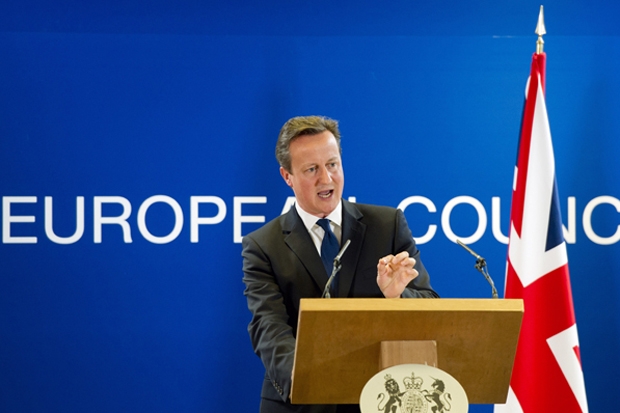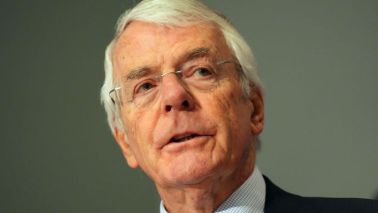[audioplayer src=”http://traffic.libsyn.com/spectator/TheViewFrom22_28_August_2014_v4.mp3″ title=”Isabel Hardman and Mats Persson discuss Cameron’s European way ” startat=830]
Listen
[/audioplayer]David Cameron loathes European Union summits, and with reason: they seldom go well for him. He has been ambushed by the French, betrayed by the Germans, seduced by the Swedes and even outsmarted by a Luxembourger — Jean-Claude Juncker, whom he tried to stop becoming President of the European Commission. He’ll meet them all again this Saturday, in Brussels, as they begin divvying up the plum jobs under Juncker’s presidency. As usual, the odds are stacked against Cameron.
By now, every EU member has nominated a commissioner to work in Brussels for the next five years. Cameron agonised over his choice and eventually sent Lord Hill, clearing another space for his cabinet ‘reshuffle for the women’. The problem is that Lord Hill is a man, and Juncker has said he’d have liked more women.
Still, the Prime Minister does have his little list of victories that he likes to cite as proof that he can get more done in Europe than his critics allow: the ‘veto’ in 2011 (an opt-out, not a veto, but never mind), the EU budget cut last year, and so on. But he appears to be limbering up to make another strategic error this autumn. The Prime Minister is reportedly considering toughening his line on his planned referendum — the idea is that he’ll say he would advocate an ‘out’ vote if he does not get the reforms he needs. He may make this declaration at the Tory conference in October to satisfy his Eurosceptic backbenchers. Or before, so he can devote the conference to the recovery.
Cameron has been stepping towards this position slowly. When he returned to the Commons after failing to block Juncker, he told MPs that he would always do what was in Britain’s national interest in a referendum. This delighted Eurosceptics, who felt he was starting to make his support for Britain’s continued membership conditional, rather than unquestionable.
The Prime Minister may think that if says he could imagine Britain leaving, it would tickle the tummies of those Eurosceptics and keep them purring until election day. But it won’t work: the Eurosceptic MPs are interested in other things. ‘It is not adequate for him to say, “If I don’t get what I want, I’ll leave,” ’ says one influential backbencher. ‘If he is not prepared to spell out what it is that he wants then it doesn’t add up to a hill of beans.’ The powerful group of right-wing Tory MPs who meet regularly in private to discuss how to advance the Eurosceptic cause is considering how best to pressure him into revealing more.
It’s not just backbenchers: cabinet ministers are also keen to hear a little more from the Prime Minister. One senior colleague warns, ‘David is going to need to go a lot further than the Sunday Telegraph article he wrote back in March. It was too broad.’ That article set out seven aims for a reformed European Union, but in vague terms that could mean almost anything. It only represented a holding line at the time, but Cameron is still referring critics to those seven aims nearly six months later.
Cameron may be hardening his line to be taken more seriously by the leaders he’s meeting on Saturday. But this could backfire, too. While Angela Merkel understands the domestic pressure her ‘naughty nephew’ is under, she is also insistent that negotiations be conducted in the ‘European way’: that is, by building alliances and not using threats to get your way. Cameron is asking the EU to make its best offer to the British public and then see it put to a vote. His referendum is a crude device: no deals, no trade-offs, just a question and 46 million answers.
Few countries that get their way conduct themselves in a ‘European way’. France can often behave in a wholly un-European manner, for instance. But the key is to sound as though you are appealing for consensus for a reform that will help the whole of Europe, even if it is simply a selfish concern. It is difficult, though, for a British prime minister to talk in the ‘European way’ when his domestic political sphere is so adversarial.
Although the Prime Minister has his ‘northern alliance’ of EU leaders with similar priorities, he needs to find time to build other links. This will be rather difficult for the next few months at least, as Cameron needs to devote all his energy to winning the general election. And British voters will hardly change their minds if he starts announcing that he’s going to repatriate regional structural funds or that he’s had some good chats with Poland’s Donald Tusk.
All of this adds weight to the argument advanced by Sir John Major and others that Cameron should appoint someone to lead the negotiations on his behalf: a European reform tsar. Sir John suggested the role in a speech to Chatham House last year, arguing that this negotiator should sit in the cabinet and ‘visit and revisit every European capital to explain our case, seek allies, set out our aims, and — crucially — emphasise the damage to the European Union as a whole if the negotiations fail and the referendum is lost’. Cameron might have thought that Philip Hammond could do this but the new Foreign Secretary will be rather more preoccupied with the ‘generational struggle’ against Isis in the Middle East. Foreign Office minister David Lidington tirelessly tours European capitals, but the negotiator should surely have a little more profile than a junior minister.
It isn’t hard to imagine who Sir John was thinking could perform this role very well. A Tory grandee would indeed fit the bill. One question, as with the previous struggle to nominate a European commissioner, is who is sufficiently robust on Europe, well known, and available to do it. A bigger question is why, if Cameron is serious about big reforms in Europe and avoiding a Brexit, he hasn’t felt the need for a European tsar to help him through those Saturday nights in Brussels.
Our blog always has a good summit.







Comments